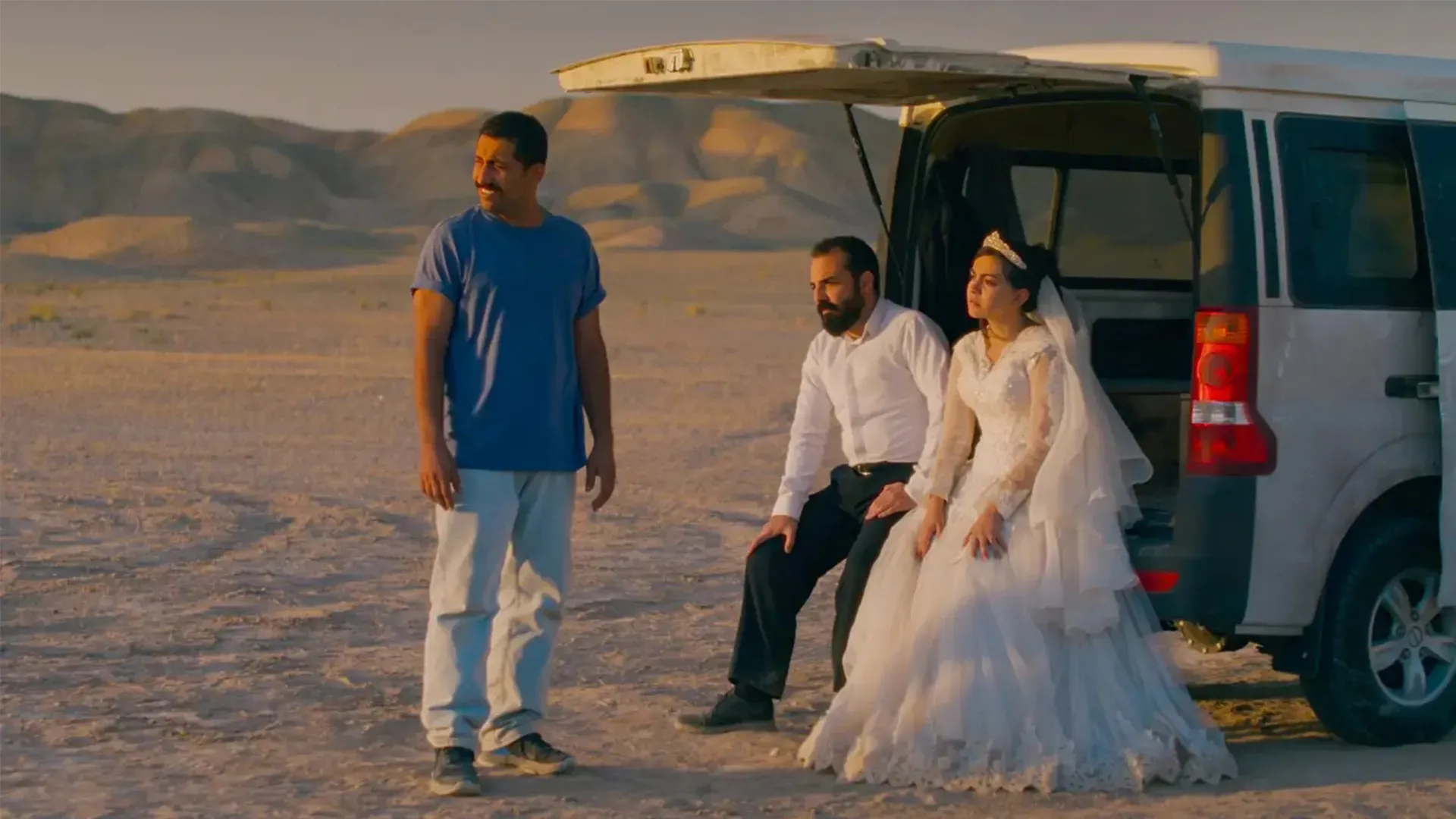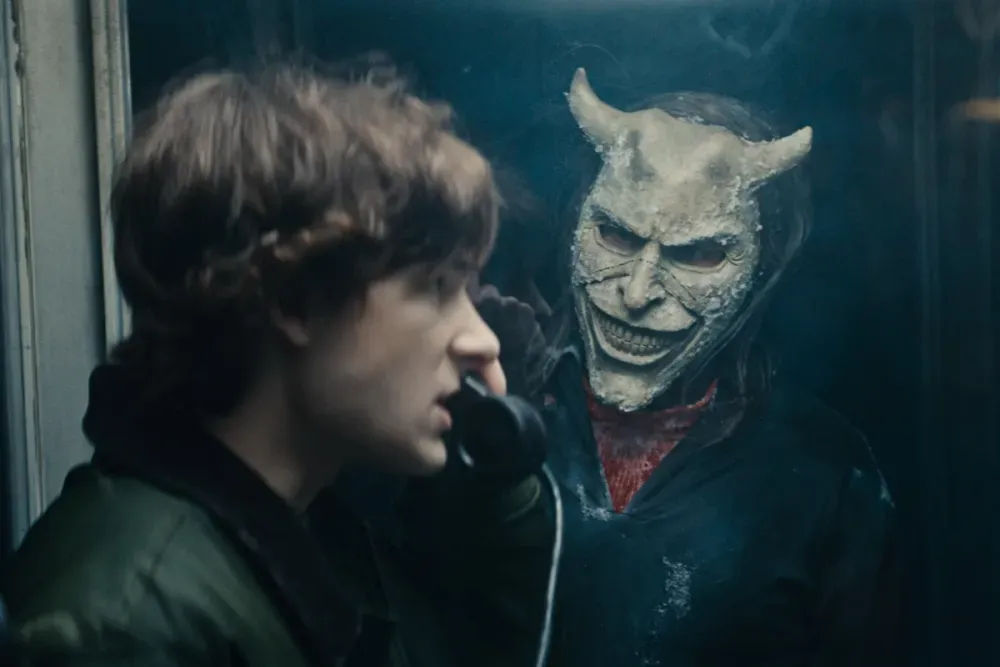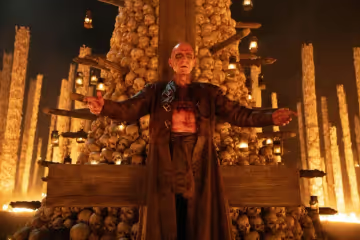In Review: ‘Frankenstein,’ ‘It Was Just an Accident,’ ‘Black Phone 2’
Guillermo del Toro delivers a memorable monster movie, Jafar Panahi issues another act of defiance, and the Grabber returns to answer the phone in a second batch of this week's new releases.

Frankenstein
Dir. Guillermo del Toro
150 min.
Guillermo del Toro was never going to half-ass Frankenstein. Even if the filmmaker had not talked about Frankenstein as a dream project for years, everything about del Toro’s past work and deep respect for the history of horror, science fiction, and fantasy suggests he’d feel obligated to honor the towering importance of Mary Shelley’s novel, a masterpiece born of a writing contest conducted amidst bad dreams and bad weather in the summer of 1816. It’s an intimidating project for any filmmaker to take on, particularly one whose career is defined in equal parts by a love of genre tradition and a desire to push beyond genres’ traditional limits. There have been plenty of Frankenstein movies, but just the idea of del Toro attempting his own version creates expectations that other filmmakers wouldn’t experience. A del Toro Frankenstein has a lot to live up to from frame one.
The Reveal is a reader-supported newsletter dedicated to bringing you great essays, reviews and conversation about movies. If you are not paid subscriber, we would love for you to click this button below and join our community.
It’s sometimes easy to feel the weight of those expectations in the film. Every element from the sets to the costumes to the tiniest prop has been thought through to the smallest detail. Every shot appears crafted to be iconic. It works, too, except in the moments when the straining for greatness makes the film feel a bit airless. Del Toro has made a mammoth, sometimes awe-inspiring Frankenstein filled with spectacular images in service of weighty themes. If only every moment didn’t keep reminding you of this. Still, it’s not like we have an overabundance of awesome, ambitious films. If del Toro’s Frankenstein sometimes feels like a bit much, better too much than too little.
Opening, as the novel does, in the frozen wastes of the Arctic, where a ship attempting to reach the North Pole has become frozen, Frankenstein seems at first like a truly faithful adaptation of Shelley’s novel. Ultimately, it’s more true to Shelley’s themes (which are paired with some of del Toro’s own) and the broad strokes of her narrative than the details of its plot. After bringing the wounded Victor Frankenstein (Oscar Isaac) aboard, the ship’s captain (Lars Mikkelsen) listens to a story of science gone too far.
After being raised by a loving mother (Mia Goth) and an abusive physician father (Charles Dance), Victor sets up shop in Edinburgh, where he experiments with animating the bodies of stitched-together corpses. The pursuit makes him a pariah in the scientific community but attracts the attention of Heinrich Harlander (Christopher Waltz), a weapons manufacturer who’s also the father of Elizabeth (also Goth), a curious woman engaged to Victor’s younger brother William (Felix Kammerer) who immediately draws Victor’s interest. Harlander has his own reasons for supporting Victor’s research (reasons that make him a precursor to the rogues gallery of tech-bro villains that have lately popped up in everything from Superman to The Naked Gun), which he does in grand fashion and with surprising success. But the resulting creation, billed in the credits as “the Creature” and played by Jacob Elordi, proves to be difficult in ways Victor could not predict. Then, in the film’s second half, Victor’s telling gives way to the Creature’s version of events, which don’t contradict Victor’s but cast them in a different light.
However late in taking center stage, Elordi’s performance also gives the film a much-needed soul. Isaac makes for a memorable mad scientist but it’s the arrival of the Creature and the revelation of his potential to become more than a mere brute that come to define del Toro’s take on the material. Elordi’s scenes with Goth, whose character recognizes his humanity long before his creator, are especially strong and help make the film’s second half both looser and more moving than its first. This really shouldn’t be a surprise, however. Del Toro’s has always had more sympathy for the monsters than those who attempt to stand in their way. Once the film finds its true hero, it becomes exactly as good as the idea of a del Toro adaptation promised: the defining 21st century cinematic Frankenstein. —Keith Phipps
Frankenstein is now playing in select theaters. It will begin streaming on Netflix on November 7th (but this is one to catch on the big screen if you can).


It Was Just an Accident
Dir. Jafar Panahi
104 min.
Jafar Panahi’s Palme D’Or winning It Was Just an Accident makes it hard to know who to trust from the start. In the opening scene, a family of three, soon to be four, drives down a road at night. When the couple’s young daughter starts dancing to a bouncy pop song, her father Rashid (Ebrahim Azizi) insists she turn it down because “The sound disturbs people.” But, as the girl points out, there’s no one else around. Surely they can do what they want? What makes him so nervous, anyway? When their car hits a stray dog, the question becomes moot, but the accident sets in motion a chain of events that will disrupt the lives of Rashid and his family.
Which leads to another question: Who is Rashid anyway? When they’re able to drive their damaged car to a nearby garage, the soft squeaking of Eghbal’s prosthetic leg sounds as loud as a klaxon to Vahid (Vahid Mobasseri). After following the family home and camping outside their house, Vahid abducts Eghbal the next day. He recognizes the squeak from his time as a political prisoner and knows it belongs to a fearsome guard named “Eghbal the Peg Leg” who delighted in torturing Vahid and others arrested in a pro-labor protest. At least he thinks he does. The sliver of doubt that he might have the wrong man makes Vahid pause midway through burying his captive alive. Seeking assurance, he decides to pack Rashid or Eghbal or whoever he back in his van and seek guidance from others who suffered under his hand.
The first film Panahi made after his 2022 arrest, the most recent of his many conflicts with the Iranian government, It Was Just an Accident is both typically uncompromising and, for long stretches, disarmingly funny. Without forgetting the grim subject at its heart, the film turns into a ramshackle journey across an unnamed Iranian city, over the course of which Vahid accumulates a band of misfits that includes everyone from a wedding photographer named Shiva (Mariam Afshari) to the groom (Majid Panahi) and short-tempered bride (Hadis Pakbaten) she was attempting to photograph. Frustration sets in the longer they take to determine who exactly Vahid has kidnapped. Then, when a crisis strikes Rashid’s (or perhaps Eghbal’s) family, the day takes yet another turn.
Perhaps inevitably, all those emotions eventually congeal into anger. Less inevitably (but just as understandably), It Was Just an Accident contains some of the bluntest statements of Panahi’s career. The mere act of making it surreptitiously is a form of protest and there are moments when Panahi seems like he wants his defiance to be unmistakable, letting his characters deliver lines filled with unvarnished fury. But even this has layers to it. Vahid and the others emerge as characters changed forever by their traumatic experiences. Whoever they were before meeting Eghbal, the man they may or may not have captured, they’re not the same people anymore and never will be. They’ll always hear the squeak that served as a prelude to their pain. Whether it’s real or imagined stopped being the point a long time ago. —Keith Phipps
It Was Just an Accident is now playing in limited release.


Black Phone 2
Dir. Scott Derrickson
114 min.
Based on the short story by Joe Hill, the 2021 horror hit The Black Phone brought a reasonably compelling sense of place and style to what was ultimately an all-you-can-eat smorgasbord of supernatural hokum. Set in a downscale Denver suburb in the late ’70s, the film is about a child serial killer, rather straightforwardly dubbed “The Grabber,” who’s been scooping up local kids in a van marked “Abracadabra,” often leaving behind a conspicuous bundle of black balloons. (Local police are somehow confounded by this mystery.) The hokum surfaces when his latest victim, Finney (Mason Thames), starts getting calls from the disconnected black phone in his basement, each from a previous victim who wants to help him survive. Then there’s Finney’s sister Gwen (Madeleine McGraw), who’s inherited the power of prescient dreams from her mother and uses this extrasensory perception to track her brother down. It is the sort of nonsense that passes for “mythology.”
The Black Phone had an ending that did not suggest a sequel, but enjoyed a box office take that did. And so now Black Phone 2 must pile more hokum on top of the previous film’s hokum in order to explain how The Grabber, a mortal killer who’s slain in graphic fashion, can run it back a second time. To that end, director Scott Derrickson, working again with his co-writer C. Robert Cargill, go hog wild in amplifying the stakes, drawing from a patchwork of sources that includes Friday the 13th, A Nightmare on Elm Street, Stranger Things, and even the analog, Super-8 texture of Derrickson and Cargill’s Sinister series. It winds up ret-conning the original film and feels like it’s making up the rules as it goes along.
After a prologue set in the late-‘50s at Alpine Lake, a Christian winter camp located deep in the Rocky Mountains, Black Phone 2 picks up four years after The Black Phone, with Finney sulking through residual trauma while Gwen’s dreams ramp up again. (In a happier development, their alcoholic father, played by the ever-enigmatic Jeremy Davies, is three years off the sauce.) Gwen’s visions lead her on a psychic journey back to Camp Alpine Lake, where she believes three boys were murdered by The Grabber and are desperate to be found under the ice. So posing as counselors-in-training, the two siblings, along with Ernesto (Miguel Mora), the brother of a previous victim, take up residence at the snowbound camp and are once again confronted by their deathless adversary.
Much like James Ransone, the comedic MVP of both Sinister and The Black Phone, Black Phone 2 benefits from a genre ringer in Demián Bichir, who isn’t silly like Ransone, but plays the camp supervisor with a distinct magnetism the sequel desperately needs. To stage a gory horror film at a sleepaway camp that also features characters attacked in their dreams isn’t particularly novel, though, and the inner strength that Gwen discovers from her ESP smacks a bit too much of “Eleven,” like Derrickson and Cargill formulated their script in a blockbuster lab. Derrickson’s instinct to lean on a low-res, Super 8-style camerawork in the film’s frequent dream sequences is fitfully effective, rendering nightmares like spools of home movies that have been decaying in the attic. But here, he’s having to reanimate a dead property. — Scott Tobias
Black Phone 2 is currently ringing in theaters.
Due to the abundance of recent releases, this is The Reveal's second review column this week. Click here for reviews of The Mastermind, Blue Moon, and Good Fortune.





Discussion